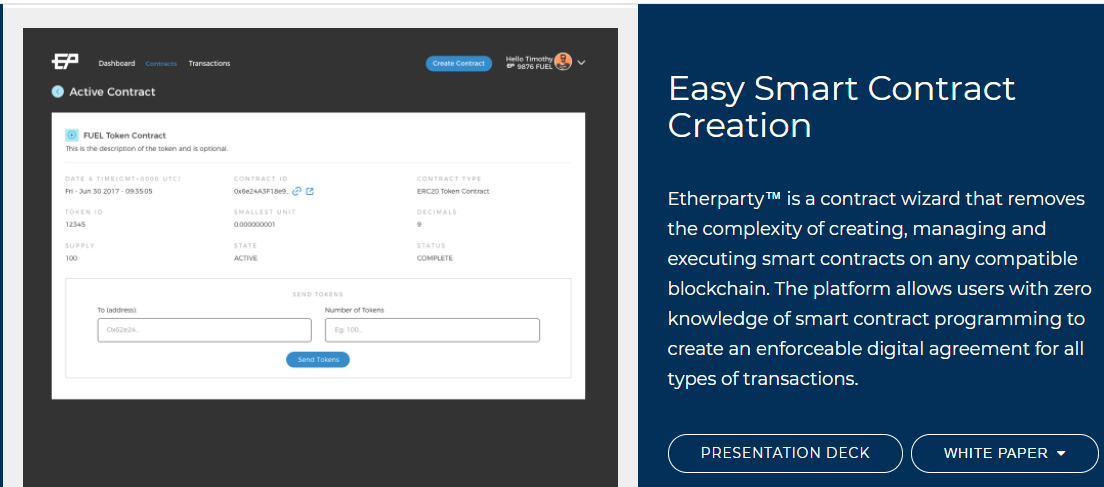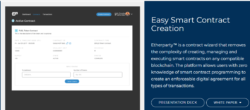Join Our Telegram channel to stay up to date on breaking news coverage
In 2017, smart contracts built on the Ethereum network exploded in popularity as a method of crowdfunding for new blockchain-based products. Etherparty, a smart contract management platform, may have entered this wave with perfect timing, as its Beta version came online heading into 2018 — which will likely be another year of explosive growth for this new technology.
This is a sponsored article.
Etherparty: Advancing Smart Contract Tech
Etherparty’s goal is to simplify the smart contract creation and management process, allowing essentially anyone to build their decentralized applications on top of the Ethereum or Bitcoin blockchains.
This platform offers a potential solution to businesses looking to utilize smart contracts, but don’t have staff with experience with this highly technical technology. According to Etherparty, platform users can create contracts using premade templates that can be customized to better meet the needs for individual projects. Apparently, “no programming experience or knowledge is required” to use these templates.
Additionally, the Etherparty team claims they have fully tested their templates to ensure safety and security.
Kevin Hobbs, CEO of Vanbex Group and Etherparty, noted “Smart contract technology will transform commerce in the years to come including the audit trails that HealthSpace is developing.”
The platform’s official website lists the following use cases as examples of what Etherparty can do:
Peer-to-peer escrow contracts Wagering Token Creation Real estate agreements Contractor agreements
All of these features will presumably be available to those without a technical knowledge of programming as premade template offerings given the team’s claims. Thus, interested users should be able to take advantage of the features as an on-demand service — contracting out things like token creation and wagering without them having to create a platform to enable such features themselves.
The ICO Craze Continues in 2018
Token creation, one of the use cases reportedly suitable for the platform, has become a hot topic in mainstream media as of late. In a process called an “Initial Coin Offering,” or ICO, tokens are bought and distributed across specialized blockchains — or through platforms built on top of well-established chains, such as Ethereum and Bitcoin. Development teams organize these ICOs to raise funds that allow them to work on their projects — and this fundraising method has proven wildly successful.
In 2017, ICOs brought in billions of dollars for their organizers, garnering the attention of mainstream industries.
Telegram, for example, a popular instant messaging service, has announced an upcoming ICO to raise funds for building a blockchain-based platform with an in-app token called “gram.” Less than two weeks after the announcement, the company raised its fundraising goal from the initial $1 billion USD target to $2 billion.
Riding the ICO hype, Etherparty held its token sale event between October 1st and October 29th. In that time, the company counted over 4,000 unique individuals that purchased the platform’s native toke, FUEL, and raised over $30 million — all in the month of October 2017.
The Road Ahead
Additionally, Etherparty launched the beta version of its platform to over 500 users on October 6. This allowed a certain number of users to see and experience EtherParty in a limited fashion, offering 3 featured contract templates for use: the creation of ERC-20 compliant Ethereum tokens, a crowdfunding contract, and a multi-party escrow agreement.
The beta launch commenced in the beginning of November, about a week after they ended their ICO. According to the EtherParty team, the largest demographic that visited their website and tested out their beta were males aged between 25 and 34.
A full launch is expected in Q1 of 2018 and they
Join Our Telegram channel to stay up to date on breaking news coverage


